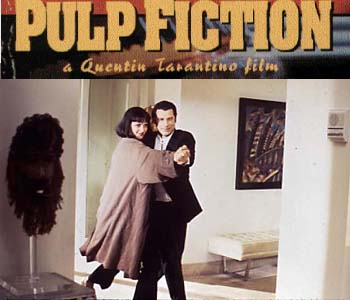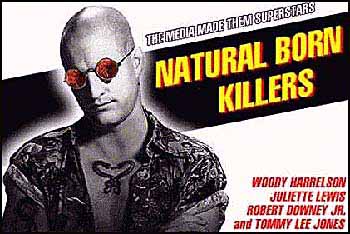Prime Cuts
Pop-Culture Tango: Uma Thurman and John Travolta did more than dance in "Pulp Fiction"--they talked Elvis and the Beatles in footage that hit the cutting-room floor.
Not every scene that rolls before the camera can be seen on the big screen
By Amy Longsdorf
THIS IS FACT, NOT FICTION. Vincent Vega, the hugable thug John Travolta plays in Pulp Fiction, is an Elvis man who shuns the Beatles. He would rather watch The Partridge Family than The Brady Bunch. And in conversations, he doesn't listen, he waits to talk.
If you're thinking, "Cut it out. That's not in Pulp Fiction," well, you're right. That's exactly what director Quentin Tarantino was forced to do. Cut it out. At least until now, since Pulp Fiction: Special Collector's Edition has hit video stores.
The $19.99 tape, which is available in both standard and letterboxed formats, features commentary by Tarantino and 12 minutes of never-before-seen footage, including one scene featuring Bruce Willis on the run with cabbie Esmeralda (Angela Jones).
In the video's best excised scene, Travolta stops by Uma Thurman's for their first "date." She greets him by sticking a camcorder in his face and quizzing him on his pop-culture preferences. Is he an Elvis or Beatles man? Is any relation to Suzanne Vega? Would he rather date Betty or Veronica?
The answers: Elvis, second cousin, Veronica.
So why did Tarantino scissor the pas de deux between Travolta and Thurman? "The scene has a checkered past," Tarantino says. "I had written it five years ago. The reason we took it out is that it had become a cliché. All these movies of the '90s had young characters pointing Super-8 cameras at each other doing these confessional interviews."
Adds Tarantino, "Another reason I took it out is because it sounded more like someone trying to write like me than me."
Pulp Fiction isn't the only movie to lose a few chapters on the way to movie theaters.
The Way We Were (1973): Starring Barbra Streisand and Robert Redford, the saddest love story of all lost two key sequences on the way to becoming a misty-watercolored memory. The first scene, an 11-minute political speech by "Babs" about Hollywood blacklisting, was trimmed from the finished print. Also cropped: a breakdown moment in which Streisand drives by a student demonstration and thinks back to her own days as an idealistic undergrad.
Why Cut: Preview audiences got restless with the politics. As for the crying scene, director Sydney Pollack says, "It's the only thing I've ever fought with Barbra over. She wanted that in, and I wanted it out. She did that scene beautifully, but there were too many crying scenes already."
Damage Done: To this day, there's talk that Streisand would have won a Best Actress Oscar based on that cut crying jag. To which Pollack responds, "Bullshit."
Hope for Restoration: Pollack has a chance to do it all again. Should he? Could he? Well, yes. A special-edition laser disc is due in stores by the end of the year.
I'll Do Anything (1994): At least a half-dozen song-and-dance numbers written by the Artist Formerly Known as Prince and sung by the likes of Nick Nolte, Julie Kavner and Albert Brooks were scissored from the Comedy Formerly Known as a Musical.
Why Cut: "The music stopped the reality totally," says writer/director James L. Brooks.
Damage Done: The $40 million movie performed to the tune of $12 million at the box office.
Hope for Restoration: Maybe. At one point, Brooks' buddy Danny DeVito expressed a desire to reconstruct the musical on laser disc, but he couldn't obtain the rights from Prince. "I love Jim Brooks," DeVito says. "And I still think it would be a cool thing to do one day."
Swing Shift (1984): Originally a riveting ensemble look at WWII factory workers, the movie became a romance when star-producer Goldie Hawn wrestled control away from director Jonathan Demme. Gone are many of co-stars Christine Lahti and Holly Hunter's best moments.
Why Cut: Goldie decided to shift the plot. "Jonathan's version is quite an interesting movie," says the movie's uncredited scripter Ron Nyswaner. "It's about the friendship between Goldie and Christine. The version that was released to theaters was a love story between Goldie and Kurt Russell."
Damage Done: The heart of the movie--not to mention Demme's trademark quirkiness--was all but wiped out.
Hope for Restoration: "There are some powerful people who would have to agree to it," Nyswaner says. "People suggest it to Jonathan all of the time, but at the moment, it's not being pursued."
The Big Chill (1983): The baby-boomer epic was once even more epic. Originally, there were flashbacks of the entire gang during their glory days at the University of Michigan. Even a then-unknown Kevin Costner, who played the corpse Alex, romped on campus alongside JoBeth Williams, Glenn Close, Kevin Kline and William Hurt.
Why Cut: Too much then, not enough now.
Damage Done: William Hurt says, "There was an audacious coda which made me swoon. You went back to the campus and saw them all there. And they were young. . . . It was a great sorrow for me that it was cut."
Hope for Restoration: Nothing official, but writer/director Lawrence Kasdan recently helped restore a special edition of Silverado.
You Mean There's More?: The original "Natural Born Killers" wasn't violent enough, so director Oliver Stone loaded the director's cut with more visual ammunition.
Natural Born Killers (1994): The body count went down when Oliver Stone edited his look at two lovers on the run (Juliette Lewis and Woody Harrelson). Sliced and diced were three minutes, including a shot of prison warden Tommy Lee Jones' severed head on a pole and a point-of-view shot of a bullet piercing Robert Downey Jr.'s body.
Why Cut: Deemed too violent for an R rating by the MPAA's ratings board.
Damage Done: Stone waged a battle with the MPAA to no avail. "People like to pick on an Oliver Stone movie," he maintains.
Hope for Restoration: A director's cut with the missing footage, 28 minute of outtakes narrated by Stone and a 22-minute documentary showing behind-the-scenes action is now available on tape and laser disc.
Broadcast News (1987): James L. Brooks turns his camera on television news, but one controversial scene involving a gay government employee's unrequited love for air-headed anchor William Hurt and one love snit between Hurt and Holly Hunter faded to black.
Why Cut: The gay scene was cut for length and the spat scissored because it gave Hurt more screen time than co-star Albert Brooks.
Damage Done: On the gay scene that was excised, Brooks says, "It was one subplot more than I could carry." On the snit fit: "It takes place at the airport," Hurt says. "Holly comes after me, and I finally turn on her. I say, 'You keep looking down on me. But what I don't know, I can learn. And what I know, nobody can teach. Take it or leave it.' I based my whole character on that moment, and then it was cut out of the film. I was devastated."
Hope for Restoration: "If somebody gave me the opportunity to add it to the laser disc, I'd do it in a second," Brooks says.
Reservoir Dogs (1992): Quentin Tarantino's breakthrough is the quintessential heist-gone-wrong flick. What went wrong in the editing room was a scene in which Mr. Orange (Tim Roth) tracks down Mr. White (Harvey Keitel) in an effort to find out more about his background.
Why Cut: Too long.
Damage Done: None. Roth says, "It's one of the only outtakes that Quentin has from the movie. The budget was so low that we didn't shoot a lot that wasn't used."
Hope for Restoration: Last year, Pioneer Electronics announced plans to release an extended director's cut on laser disc. But, at the moment, the disc is officially "on hold."
Basic Instinct (1992): As if things weren't steamy enough, 42 seconds of "controversial footage" was sliced before the erotic thriller's theatrical release. Pruned were moments of Stone ice-picking her first victim to death, a rough-sex struggle between Michael Douglas and Jeanne Tripplehorn and an oral sex moment between Douglas and Stone.
Why Cut: To avoid mass heart attacks from the ratings board.
Damage Done: Stone doesn't think her character was, ahem, fleshed out enough. "I have to weave this web that Michael has to pull himself out of," she says. "The intense sex was part of it."
Hope for Restoration: Done. Just go and rent "The Original Director's Cut" on video and laser disc.
[ Metro | Metroactive Central | Archives ]
This page was designed and created by the Boulevards team.

Linda R. Chen
Sidney Baldwin
From the December 5-11, 1996 issue of Metro
Copyright © 1996 Metro Publishing, Inc.
![[Metroactive Movies]](/movies/gifs/movies468.gif)